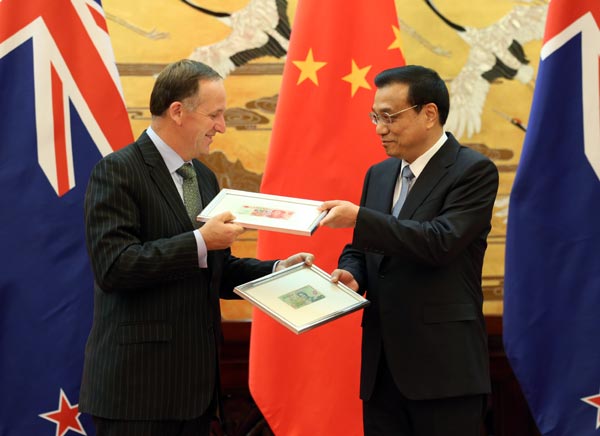Direct currency trading begins with New Zealand
By ZHAO SHENGNAN (China Daily) Updated: 2014-03-19 00:08
|
 Premier Li Keqiang (R) and New Zealand Prime Minister John Key exchange sample banknotes at a ceremony in the Great Hall of the People in Beijing on Tuesday. They announced that the two countries have approved direct trading between their currencies. Photo by Wu Zhiyi / China Daily
|
China and New Zealand announced a landmark deal on Tuesday that allows the direct trading of the two countries' currencies.
The deal, which takes effect on Wednesday, ends the need for companies and currency traders to convert Chinese yuan or New Zealand dollars into a third currency, usually US dollars, when making or receiving payments.
The move will cut the costs of conversion while boosting cooperation in trade and finance, Premier Li Keqiang said during a meeting with New Zealand's Prime Minister John Key.
Li called for New Zealand to continue supporting China's financial organizations as they set up branches there and recommended that its enterprises use Chinese currency.
The agreement will make doing business with China easier, Key said, adding that New Zealand looks at the deal as an opportunity to expand cooperation with China in a variety of fields including trade, finance, education and tourism.
New Zealand's currency is the sixth to be granted direct-trade status, after the US dollar, Japanese yen, Australian dollar, Russian rouble and Malaysian ringgit.
Rapidly growing bilateral trade is right for New Zealand, observers say.
"It makes sense for this country to follow in Australia's footsteps and notch a convertibility deal," Fran O'Sullivan, a columnist at the New Zealand Herald, said in a recent article.
New Zealand reported November numbers marking its first trade surplus in 22 years as rising dairy exports into China made it the country's biggest trading partner.
According to Key's previous estimate, bilateral trade volume will exceed 20 billion New Zealand dollars ($17.24 billion) by 2015.
Zhang Yuanyuan, former Chinese ambassador to New Zealand, said the deal will encourage more Chinese traders, students and tourists to interact with the country.
It is also likely to portend more such deals between China and other countries, Zhang said.
But first, both sides should "fully implement" the free trade agreements signed in 2008 that helped New Zealand survive the recent global financial crisis, he said.
Li said the Chinese government encourages capable and credible enterprises to invest in New Zealand and participate in infrastructure construction there, while Beijing also hopes Wellington will facilitate those enterprises by easing restrictions on the access of Chinese skilled workers and raw materials.
Zhang, the ambassador, said strengthening economic ties with China has been a top priority for New Zealand as an increasingly open China and richer Chinese people will need more products from the country such as milk and livestock.
Before his departure for China, Key said he hoped to restore the baby formula market's confidence in the country's products after the botulism scare of 2013.
Fonterra, New Zealand's largest exporter of baby formula, admitted last week to four charges that it failed to meet standards and notify officials soon enough after they discovered a problem.
During the meeting with Li, Key reassured his Chinese counterpart that his country would take strict measures to guarantee food safety.
Key is scheduled to meet President Xi Jinping on Wednesday and conclude his visit in Shanghai on Thursday.
- China’s groundwater plagued by pollution
- More Chinese medical aid heads to Africa
- Nations join hands for Antarctic study
- Generation fun
- China boasts world's fastest supercomputer
- Drowning leading cause of death for kids in China
- Former blogger sentenced for four years
- Fox Hunt nabs its prey abroad
- Putin's tiger keeps Chinese reserve on tenterhooks
- Rule of law will boost foreign confidence






